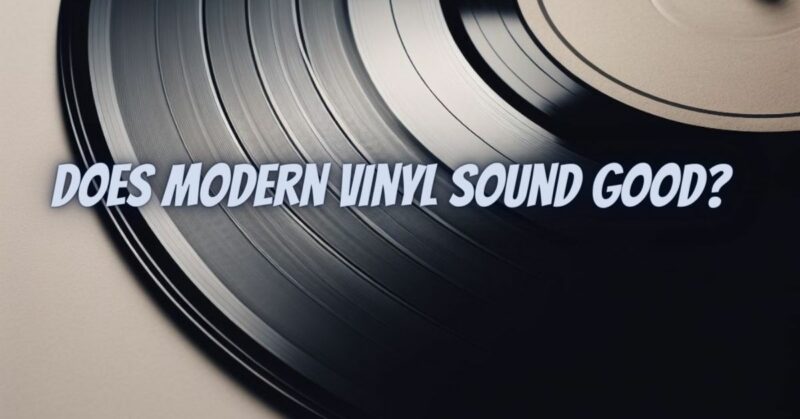The resurgence of vinyl records in recent years has rekindled debates and discussions about the audio quality of modern vinyl. Enthusiasts and audiophiles are divided on whether modern vinyl records, produced in an era of digital technology, can truly deliver a high-quality listening experience comparable to their analog predecessors. In this comprehensive article, we will explore the factors influencing the sound quality of modern vinyl, including mastering techniques, pressing quality, playback equipment, and the subjective nature of sound perception.
The Vinyl Resurgence
The revival of vinyl records has been marked by a resurgence of interest in analog music playback. Music enthusiasts and collectors have gravitated toward vinyl for its tactile experience, large album artwork, and the perception of superior sound quality. This resurgence has prompted record labels, artists, and pressing plants to cater to the demand by producing new vinyl records, often accompanied by meticulous remastering efforts.
Modern Vinyl Records: Factors Affecting Sound Quality
- Mastering Techniques:
- Digital Mastering: Many modern vinyl records are sourced from digital recordings, leading some purists to question their authenticity. While digital mastering can offer precision and flexibility, it may lack the warm, organic sound associated with analog mastering.
- Analog Mastering: Some modern vinyl records are meticulously mastered from analog sources, preserving the warmth and dynamic range of the original recordings. These analog mastering techniques aim to capture the essence of classic vinyl sound.
- Pressing Quality:
- Quality Control: The quality of the vinyl pressing process plays a pivotal role in the sound quality of modern records. Records pressed with meticulous quality control are less likely to exhibit issues like surface noise, off-center holes, or non-fill (incomplete grooves).
- Vinyl Formulation: The choice of vinyl formulation can affect the durability and audio fidelity of a record. High-quality vinyl formulations can contribute to better sound quality and reduce the risk of surface noise.
- Playback Equipment:
- Turntables and Cartridges: The quality of playback equipment, including the turntable, cartridge, and stylus, significantly influences the perceived sound quality. High-end equipment can extract more detail and clarity from any vinyl record, be it modern or vintage.
- Amplification and Speakers: The amplification and speakers used for playback also contribute to the overall listening experience. High-quality amplifiers and speakers can reveal nuances and depth in the music.
- Record Condition:
- Vinyl Condition: The condition of the vinyl record itself is crucial. Well-maintained records, regardless of their age, are more likely to offer optimal sound quality. Records that are free from scratches, warping, and dirt are essential for a good listening experience.
- Stylus and Cleaning: Regular maintenance of the stylus and cleaning of the record surface are essential to reduce surface noise and distortion.
The Subjective Nature of Sound Quality
Sound quality is inherently subjective and can vary from person to person. Factors such as personal preferences, hearing acuity, and the listening environment all play a role in how individuals perceive sound quality. Some listeners may prefer the pristine clarity of digital recordings, while others may gravitate toward the warmth and character of vinyl.
The question of whether modern vinyl sounds good ultimately depends on individual preferences and priorities. While the resurgence of vinyl has led to advancements in mastering and pressing technology, as well as access to high-quality analog sources, it’s essential to recognize that sound quality can be subjective.
Audiophiles and music enthusiasts are encouraged to explore both vintage and modern vinyl records, keeping in mind that the overall listening experience is influenced by factors such as equipment, vinyl condition, and mastering techniques. Regardless of the source, vinyl records continue to offer a unique and captivating listening experience that resonates with those who appreciate the analog charm and timeless appeal of vinyl. Ultimately, the enjoyment of music on vinyl is a deeply personal and subjective journey.

